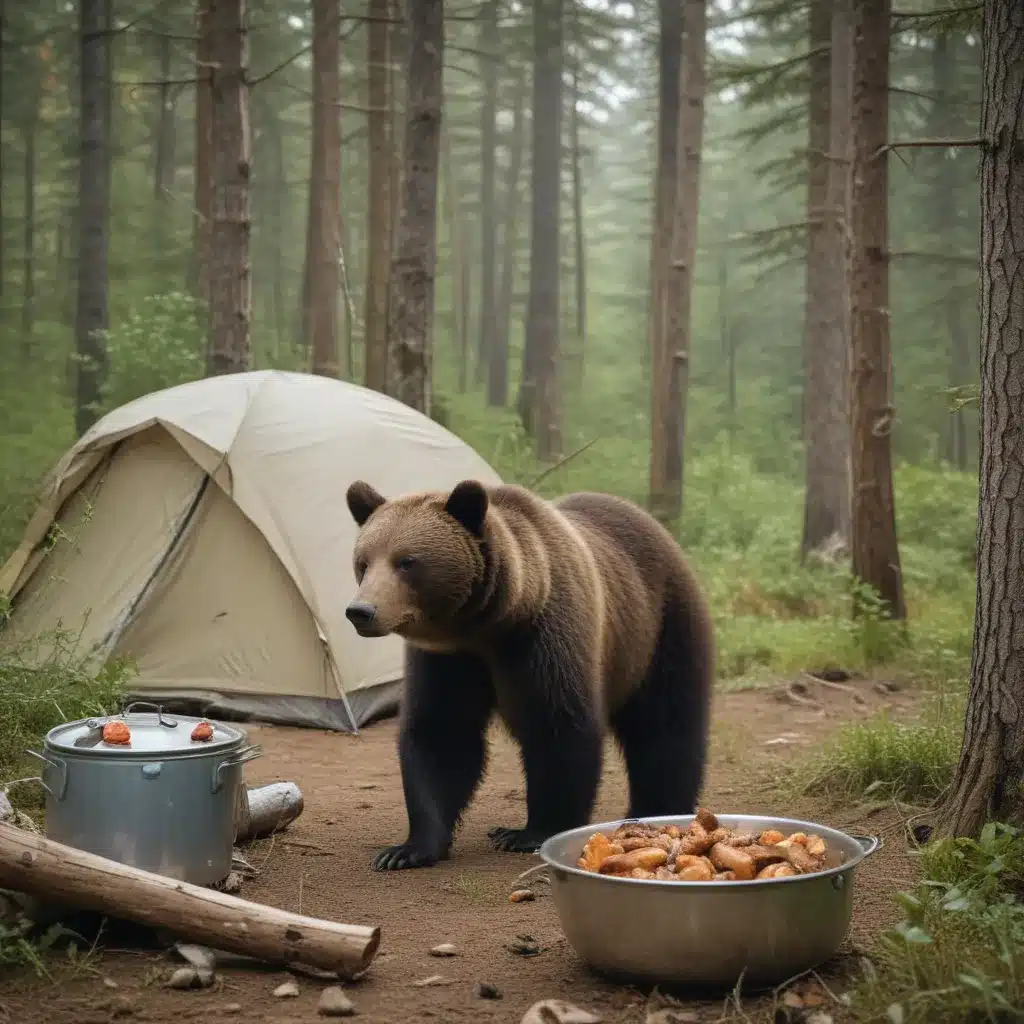
Ah, the Scottish Highlands – where the mountains pierce the sky, the lochs shimmer like mirrors, and the wildlife reigns supreme. As a seasoned camper, I’ve had my fair share of adventures (and misadventures) in these rugged, picturesque landscapes. And one of the most crucial aspects of a successful camping trip? Keeping your food safe from the furry, hungry locals.
Understanding Bear Behavior
When you’re camping in the Scottish Highlands, you’re essentially inviting your neighbors to dinner – and by neighbors, I mean the majestic yet intimidating bears that call this region home. These magnificent creatures are not only fascinating to observe, but they can also pose a serious threat if you don’t take the proper precautions.
According to the National Park Service, bears have an incredible sense of smell and a knack for sniffing out any potential food sources, whether it’s a carelessly stored bag of chips or a well-hidden cooler. These clever creatures are also remarkably persistent, and they’ll often return to areas where they’ve found food in the past, becoming increasingly bold and aggressive over time.
So, what’s a camper to do? The key is to understand bear behavior and take proactive steps to keep your food – and yourself – safe. As the old saying goes, “An ounce of prevention is worth a pound of cure,” and that couldn’t be more true when it comes to camping in bear country.
Proper Food Storage Techniques
One of the most crucial steps in keeping bears at bay is to store your food properly. The U.S. Forest Service recommends using bear-resistant containers, also known as “bear canisters,” to store all your food, trash, and even toiletries. These sturdy, tamper-proof containers are designed to withstand the relentless attempts of even the hungriest bears.
If you’re not using a bear canister, you’ll need to hang your food from a tree, ensuring that it’s at least 12 feet off the ground and 6 feet away from the tree trunk. This technique, known as “bear bagging,” can be a bit of a workout, but it’s an effective way to keep your snacks out of reach.
And speaking of snacks, it’s important to keep all food, even crumbs and spills, well-contained. REI recommends sealing up any food items in airtight bags or containers, and avoiding cooking near your tent to prevent any lingering smells.
Staying Vigilant and Avoiding Surprises
Now, even with all your food safely stowed away, you’ll still need to be vigilant and keep an eye out for any curious or hungry bears. According to Quora, making noise while you’re hiking or moving around the campsite can help alert bears to your presence and give them time to avoid you. This could be as simple as talking, singing, or even carrying a bear bell.
And if you do encounter a bear, it’s crucial to remain calm and never run. Instead, slowly back away while facing the bear, and make yourself appear as large as possible by raising your arms or jacket. In the unlikely event of an attack, fight back with any available tools or objects, aiming for the bear’s face and nose.
Remember, bears are generally more afraid of us than we are of them, but it’s still important to respect their territory and take the necessary precautions to keep everyone safe. After all, the last thing you want is to have your peaceful camping trip interrupted by a run-in with a hungry, curious bear.
Conclusion
Camping in the Scottish Highlands is an unforgettable experience, but it’s one that requires a bit of preparation and vigilance. By understanding bear behavior, properly storing your food, and staying alert, you can enjoy the beauty of this rugged landscape while keeping yourself and your furry neighbors safe.
So, grab your bear canister, practice your best bear-deterring techniques, and get ready for an adventure in the Highlands that you’ll remember for years to come. And who knows, you might even spot a glimpse of those magnificent, awe-inspiring creatures in their natural habitat. Just be sure to keep your food well-hidden!
Remember, the key to a successful and bear-free camping trip in the Scottish Highlands is to plan ahead and stay prepared. With a little bit of caution and a lot of appreciation for the incredible wildlife around you, you’re sure to have an unforgettable experience in this stunning corner of the world.

